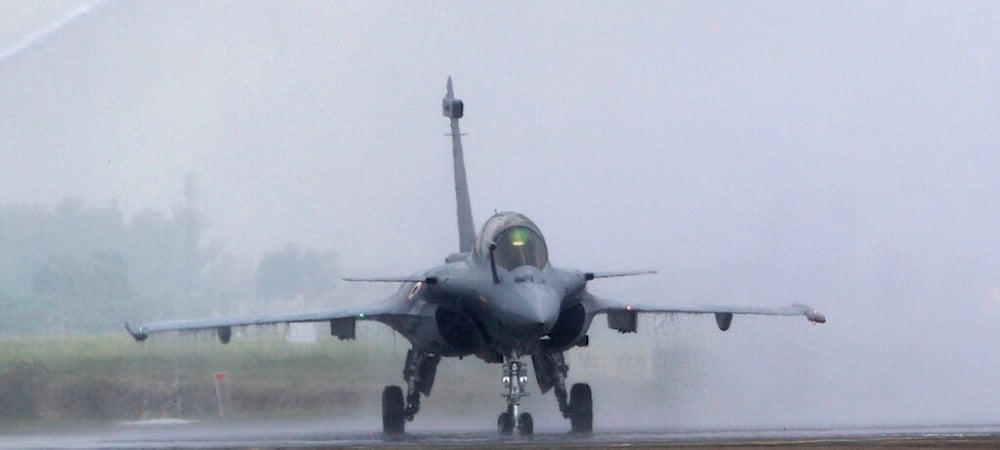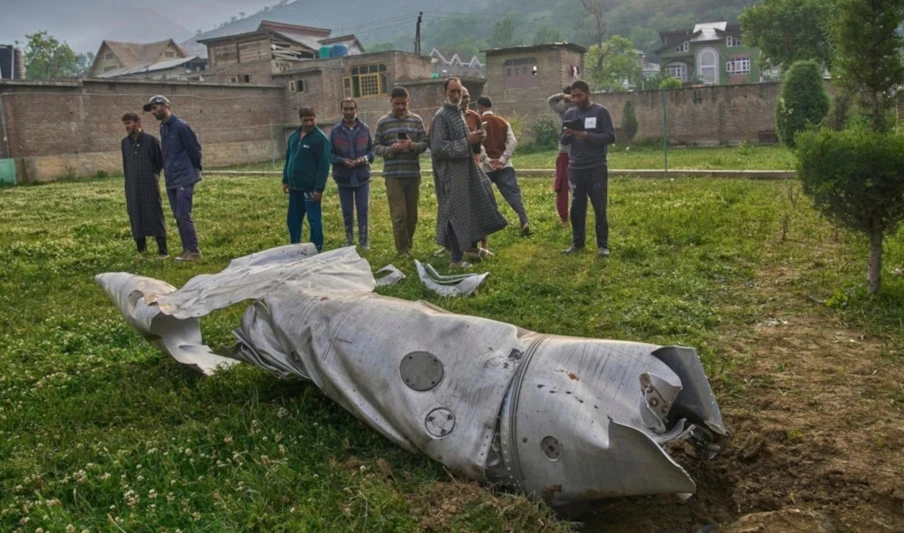How Pakistan downed a Rafale, exposed India's intel failures: Reuters
A major air battle between India and Pakistan on May 7, involving over 100 aircraft, exposed India's intelligence failures and showcased Pakistan's use of Chinese technology and integrated warfare systems, marking a shift in regional airpower dynamics.
-

Water is sprayed on a French-made Rafale fighter jet during its induction ceremony at the Indian Air Force Station in Ambala, India, Thursday, Sept.10, 2020. The first batch of five planes, part of a $8.78 billion deal signed between the two countries in 2016 had arrived here in July (AP Photo/Manish Swarup)
A report published on Reuters by writers Saeed Shah and Shivam Patel reveals how a high-stakes aerial confrontation between India and Pakistan in early May marked one of the largest air battles in decades, reshaping military calculations and defense alliances across Asia.
The conflict erupted just after midnight on May 7, when the Pakistan Air Force (PAF) detected a wave of incoming Indian fighter jets. Tensions had been escalating following a deadly attack in Indian-administered Kashmir that left 26 civilians dead, a strike New Delhi blamed on Pakistan-backed militants. Although Islamabad denied involvement, Indian forces launched retaliatory air strikes, targeting locations in Pakistan.
Air Chief Marshal Zaheer Sidhu had been stationed near the PAF operations room in anticipation of Indian action. According to a senior PAF official, Sidhu quickly ordered the launch of Pakistan's J-10C fighter jets and directed his team to engage Indian Rafales, describing the French-made aircraft as "the jewel of India's fleet." The official recalled, "He wanted Rafales."
Fatal Miscalculation
The aerial battle involved around 110 aircraft and unfolded entirely at night, a scale not seen in air warfare for many years. One Rafale was reportedly shot down, according to US officials cited by Reuters in May, a development that raised doubts about the supremacy of Western defense systems compared to newer Chinese models like the J-10C.
Dassault Aviation, the French manufacturer of the Rafale, saw its stock dip in response to the incident. Indonesia, a key Rafale customer, is now reportedly reassessing its commitment and considering the purchase of J-10Cs instead.
According to both Indian and Pakistani officials interviewed by Reuters, the downing of the Rafale wasn't due to any shortcoming in the aircraft itself. Rather, Indian intelligence had underestimated the operational range of the PL-15 missile carried by the J-10C. Indian officials admitted that their forces had assumed the missile's range was limited to 150 km. "We ambushed them," a PAF official said, adding that Pakistan also deployed electronic warfare tactics to disrupt India's defense systems, though Indian sources contest how effective those efforts were.
Justin Bronk, an air warfare expert at the Royal United Services Institute (RUSI) in London, observed, "The Indians were not expecting to be shot at," and added, "The PL-15 is clearly very capable at long range." The missile that brought down the Rafale was reportedly launched from around 200 kilometers away, or even farther, according to some Indian sources.
Situational Superiority
While India's government has not publicly confirmed the loss of a Rafale, several indicators suggest it occurred. France's air chief acknowledged in June that he had seen evidence confirming the destruction of one Rafale and two additional Indian aircraft, including a Russian-made Sukhoi. A Dassault executive also confirmed India had lost a Rafale, though he lacked specific operational details.
Reuters found that Pakistan's edge in the engagement stemmed from its superior situational awareness, achieved through an integrated "kill chain" that combined land, air, and space-based sensors. Pakistani officials said the network included their indigenous Data Link 17 system, which bridged Chinese hardware with a Swedish surveillance aircraft. This setup enabled the J-10s to operate with their own radars turned off, reducing the chance of detection.
In contrast, Indian officials noted that efforts to build a similar network remain complicated due to the diversity of their weapons suppliers. Retired UK Air Marshal Greg Bagwell remarked, "The winner in this was the side that had the best situational awareness."
Radar Deception
The battle began with Indian jets hitting what they described as militant infrastructure. PAF officials said India deployed 70 aircraft, more than expected, creating a crowded airspace ideal for Pakistan's PL-15s. Bagwell noted that this engagement was the first in the modern era where both sides fired weapons exclusively from beyond visual range while remaining inside their own airspaces.
Indian sources denied that their Rafales were blinded by electronic interference but admitted that Pakistani jamming had impacted their Sukhoi jets. They added that losses were partly due to political limitations. India's defense attaché in Jakarta said the country's pilots had been ordered not to strike Pakistan's military infrastructure directly, which, he claimed, limited their effectiveness: "only because of the constraint given by the political leadership to not attack (Pakistan's) military establishments and their air defenses."
General Anil Chauhan, India's chief of defense staff, told Reuters the country "rectified tactics" quickly after the initial losses. In the days that followed, India launched precision strikes against Pakistani air defenses using its indigenous BrahMos cruise missile. On May 10, Indian forces reportedly targeted nine air bases and a surveillance aircraft, escalating the fight until a ceasefire was brokered later that day following US intervention.
India's deputy army chief Lt. Gen. Rahul Singh later accused Pakistan of receiving "live inputs" from China during the conflict, hinting at real-time intelligence support, an allegation Islamabad denies.
Read more: Pakistan hails Chinese jets in repelling India strikes
At a July press conference, Chinese Foreign Ministry spokesperson Mao Ning responded to questions about Beijing's role by stating that defense cooperation with Pakistan is "part of the normal cooperation between the two countries and does not target any third party."
Two PAF officials told Reuters that China's air chief, Lt. Gen. Wang Gang, visited Pakistan in July to discuss how its forces utilized Chinese systems during the engagement. The Pakistani military later stated that Wang had shown "keen interest in learning from PAF's battle-proven experience in Multi Domain Operations."

 6 Min Read
6 Min Read









